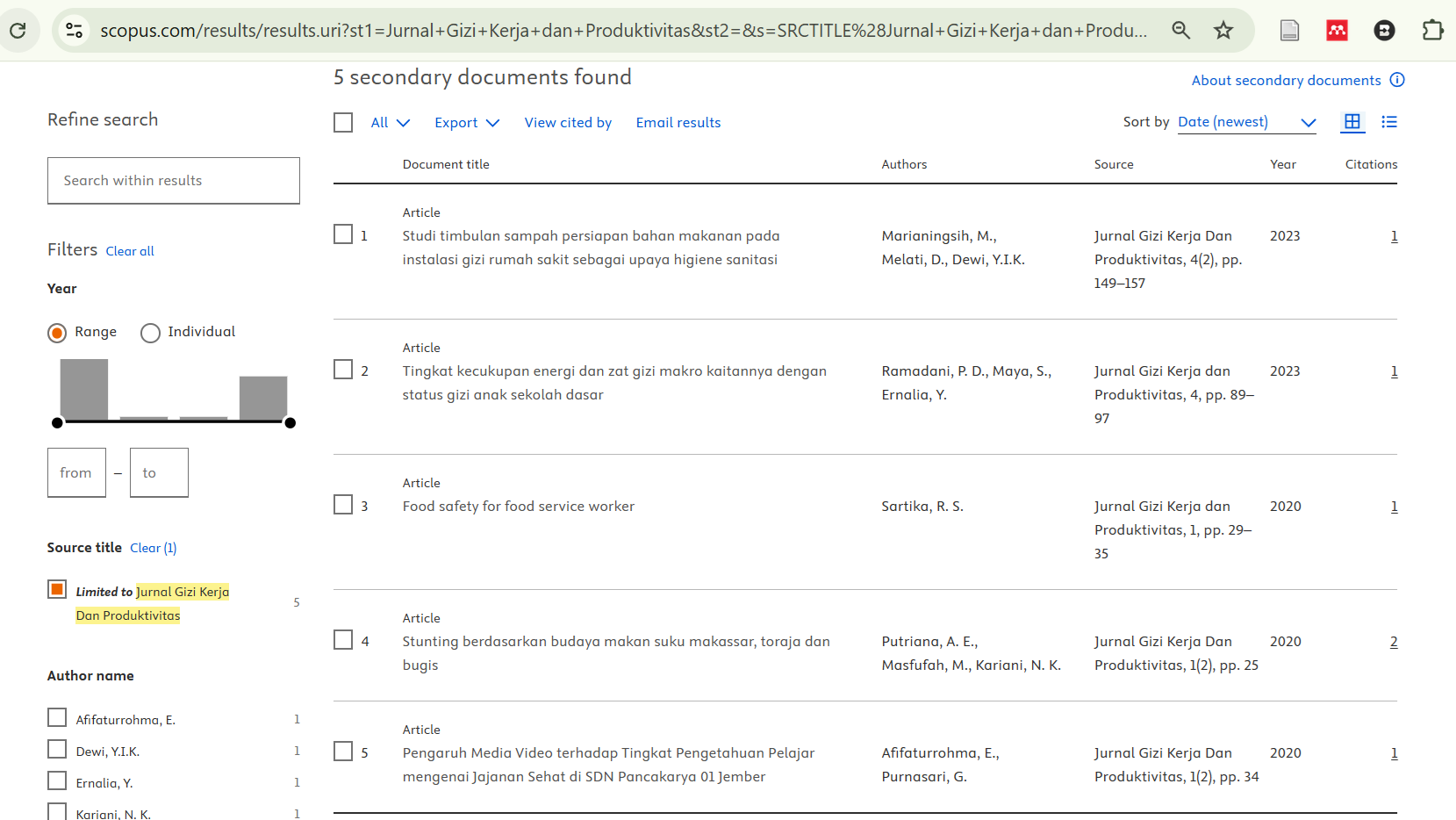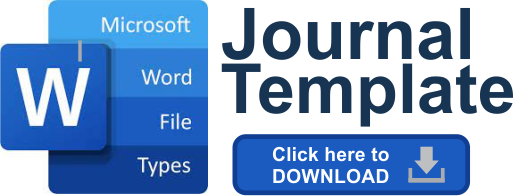- » Focus and Scope
- » Section Policies
- » Peer Review Process
- » Publication Frequency
- » Open Access Policy
- » Archiving
- » CitednessinScopus
- » Publication Ethics
- » Article Processing Charges (APCs)
- » Licensing
- » Open Access Policy
- » Indexing
- » Plagiarism Policy
- » Template Journal
- » History Journal
Focus and Scope
Jurnal Gizi Kerja dan Produktivitas is an open access and peer-reviewed journal that aims to offer a national and international academic platform for nutrition and health
This journal publishes articles and reviews scientific in field focus on:
- Occupational nutrition
- Clinical nutrition and dietetics
- Community nutrition
- Management of food services
- Sports nutrition
- Functional food
- Nutrition and productivity
- Education and promotion of health and nutrition
Section Policies
Articles
Review
Peer Review Process
Peer review process
Introduction to peer review
What is peer-reviewed?
Peer-review is a system used to assess the quality of a manuscript before publication. Independent researchers in the relevant research field assessing relevant manuscripts assess submitted manuscripts for originality, validity, and significance to help editors determine whether or not a manuscript should be published in their journal.
How does it work?
When a manuscript is submitted to the journal, it is assessed by the editorial team whether the manuscript is feasible and meets the criteria for further processing. If so, the editorial team will select potential peer reviewers in the research field to review the manuscript and make recommendations.
In the review process, the article will be reviewed by at least 1 or 2 reviewers to ensure the quality of the article
The type of peer-review used by IF:
Single-blind review: Here, the names of the reviewers are not known by the author.
Why is it peer-reviewed?
Peer-review is an integral part of scientific publications confirming the validity of the manuscript. Reviewers are experts who volunteer their break time to help improve the manuscripts they review. By being peer-reviewed, the manuscript must be:
Stronger peer reviewers may point to gaps in the paper that require more explanation or additional experimentation.
Easier to read, if parts of the author's paper are difficult to understand, the reviewer can suggest changes.
More usefully, peer-reviewers also consider the importance of the author's paper for others in their respective fields.
Publication Frequency
Jurnal Gizi Kerja dan Produktivitas is a journal published by Faculty of Medicine, Universitas Sultan Ageng Tirtayasa,
Published twice a year, in May and November.
Starting from May 2023, we accept up to 15 papers consisting of Research Articles and Review Articles
Open Access Policy
Jurnal Gizi Kerja dan Produktivitas is loyal to open access to academic work.
All the original articles and review papers published in this journal are free to access immediately from the date of publication. We don’t charge any fees for any reader to download articles and reviews for their own scholarly use.
Jurnal Gizi Kerja dan Produktivitas (P-ISSN: 2745-6404, E-ISSN: 2774-2547) is licensed under a Creative Commons Attribution 4.0 International License.
Archiving
This journal utilizes the LOCKSS system to create a distributed archiving system among participating libraries and permits those libraries to create permanent archives of the journal for purposes of preservation and restoration. More...
CitednessinScopus

Publication Ethics
Jurnal Gizi Kerja dan Produktivitas, using guidelines issued by the Publication Ethics Committee (COPE). Jurnal Gizi Kerja dan Produktivitas requires that all articles involving human subjects respect the principles of research ethics as set forth in the Helsinki Declaration. The research involving animals as subjects is also required to comply with the International Principles for Biomedical Research issued by the International Health Information Science Board (CIOMS). Ethical publications should be clear in order to improve the quality of research. Jurnal Gizi Kerja dan Produktivitas COPE adjusts to meet ethical standards for publishers, editors, authors, and reviewers.
Here are the ethical standards for editors, authors, and reviewers.
Editors
- The editor should be responsible for each article published in Jurnal Gizi Kerja dan Produktivitas.
- The editor should help the author to follow the Guide for authors.
- The editor can communicate with other editors and reviewers in making the final decision.
- An editor should evaluate the manuscript objectively for publication, assessing each quality regardless of citizenship, ethnicity, political belief, race, religion, gender, seniority, or institutional affiliation of authors. The editor must reject the assignment if there is a potential conflict of interest.
- The editor needs to make sure the documents sent to the reviewers do not contain information from the author, and vice versa.
- Editor's decision should be notified to the author with the reviewers' comments unless it contains offensive or defamatory remarks.
- The editor must respect the author's request that one should not review its submission if this excuse is reasonable and practical.
- The editor and all staff should ensure the confidentiality of the submitted manuscript.
- The editor will be guided by a COPE flowchart if there is a false suspicion or disputed authorship.
Reviewers
- Reviewers commented on possible errors in research and ethical publications.
- The reviewer should do the job on time and notify the Editor if they can’t complete the job.
- The reviewer must maintain the confidentiality of the manuscript.
- The reviewer may not accept and review the manuscript if there is a potential conflict of interest between them and the author.
Authors
- The author ensures that the material to be published has not been published and sent to other places simultaneously.
- Authors must verify the authenticity of their research and they have quoted others correctly according to the reference format.
- The author is not involved in plagiarism.
- The author should follow the criteria described in the writing guidelines to the author.
- Authors are not advised to publish any personal information that might make the patient's identity recognizable in the form of a description, photograph or genealogy section. If the patient's photo is very important and very necessary as scientific information, the author has got written approval and has stated it clearly.
- In the case of human trials, the authors state that the study was in accordance with the ethical standards of the Helsinki declaration, which led human experiments. If there is any doubt raised whether the study took place according to the declaration, then the author should explain it. In the case of animal experiments, the authors have authorized that the authors have followed the guidelines and abroad with regard to animal experiments in the laboratory.
- The author must submit data and details to the editor, if suspected of falsification or data creation.
- The authors should clarify everything that could lead to conflicts of interest such as employment, research costs, consultation fees, and intellectual property for guidelines for authors.
Article Processing Charges (APCs)
This journal charges the following author fees.
Article Submission FREE: Rp 0.00
Article Publication IDR 500.000
Licensing

Jurnal Gizi Kerja dan Produktivitas (P-ISSN: 2745-6404, E-ISSN: 2774-2547) is licensed under a Creative Commons Attribution 4.0 International License.
Open Access Policy
Jurnal Gizi Kerja dan Produktivitas is loyal to open access to academic work.
All the original articles and review papers published in this journal are free to access immediately from the date of publication. We don’t charge any fees for any reader to download articles and reviews for their own scholarly use.
Jurnal Gizi Kerja dan Produktivitas (P-ISSN: 2745-6404, E-ISSN: 2774-2547) is licensed under a Creative Commons Attribution 4.0 International License.
Plagiarism Policy
- Plagiarism and self-plagiarism are not allowed;
- The authors should ensure that they have written entirely original works, and if the authors have used the work and/or words of others that this has been appropriately cited or quoted;
- An author should not in general publish manuscripts describing essentially the same research in more than one journal or primary publication. Submitting the same manuscript to more than one journal concurrently constitutes unethical publishing behavior and is unacceptable;
- Proper acknowledgment of the work of others must always be given. Authors should cite publications that have been influential in determining the nature of the reported work.
Working Process:
- Editorial Team checking manuscript on offline and online databases manually (checking proper citation and quotation);
- Editorial Team checks the manuscript by using the Turnitin app. If it is found plagiarism indication (more than 25%), the board will reject the manuscript immediately.
History Journal
Jurnal Gizi Kerja dan Produktivitas
- First published online and in print in 2020 with volume 1 no 1
- Vol 1 No 1 (2020) to Vol 4 No 1 (2023) published on the Website https://jurnal.untirta.ac.id/index.php/JGKP/issue/archive (Old Website (OJS 2))
- SINTA 4 accreditation in 2023
- All previous publications on the old website have been moved to the newest website
- In August 2023, migration to the latest Website, namely https://ejournal.untirta.ac.id/jgkp/index (New Website (OJS 3))
- In August 2023, migration to the latest Website, namely https://ejournal.untirta.ac.id/jgkp/index
- In 2024, the Journal of Occupational Nutrition and Productivity Website has moved to a new address: https://jurnal.untirta.ac.id/index.php/JGKP/index

